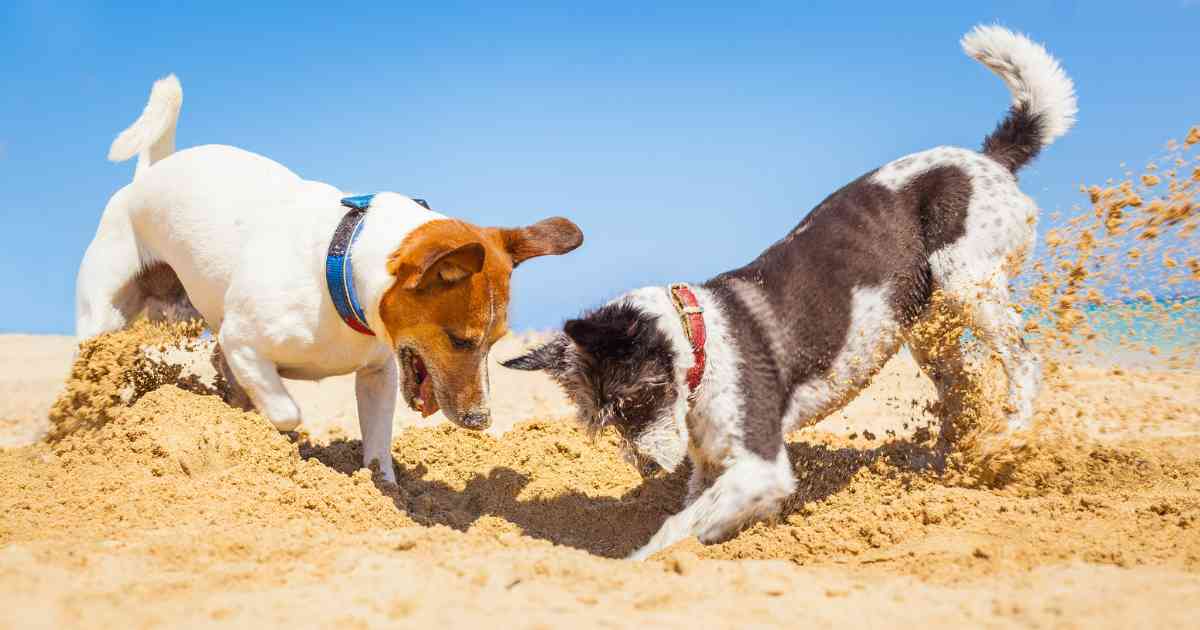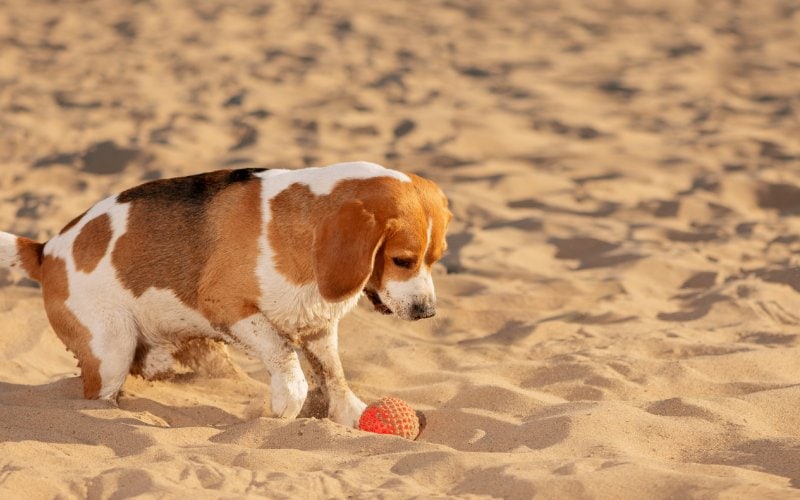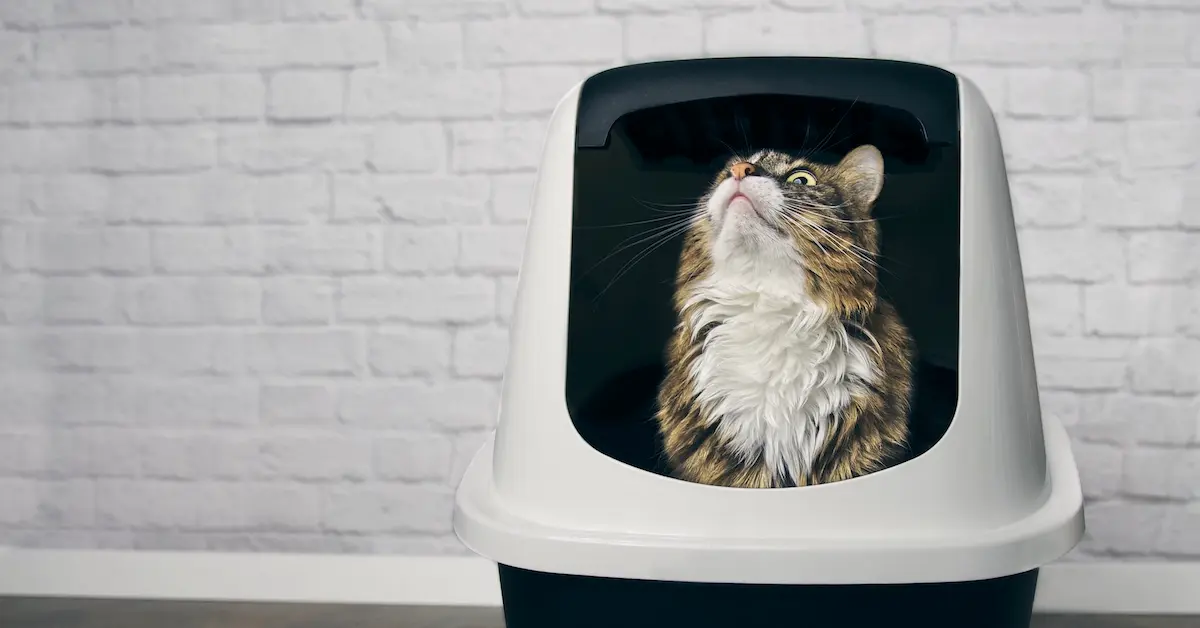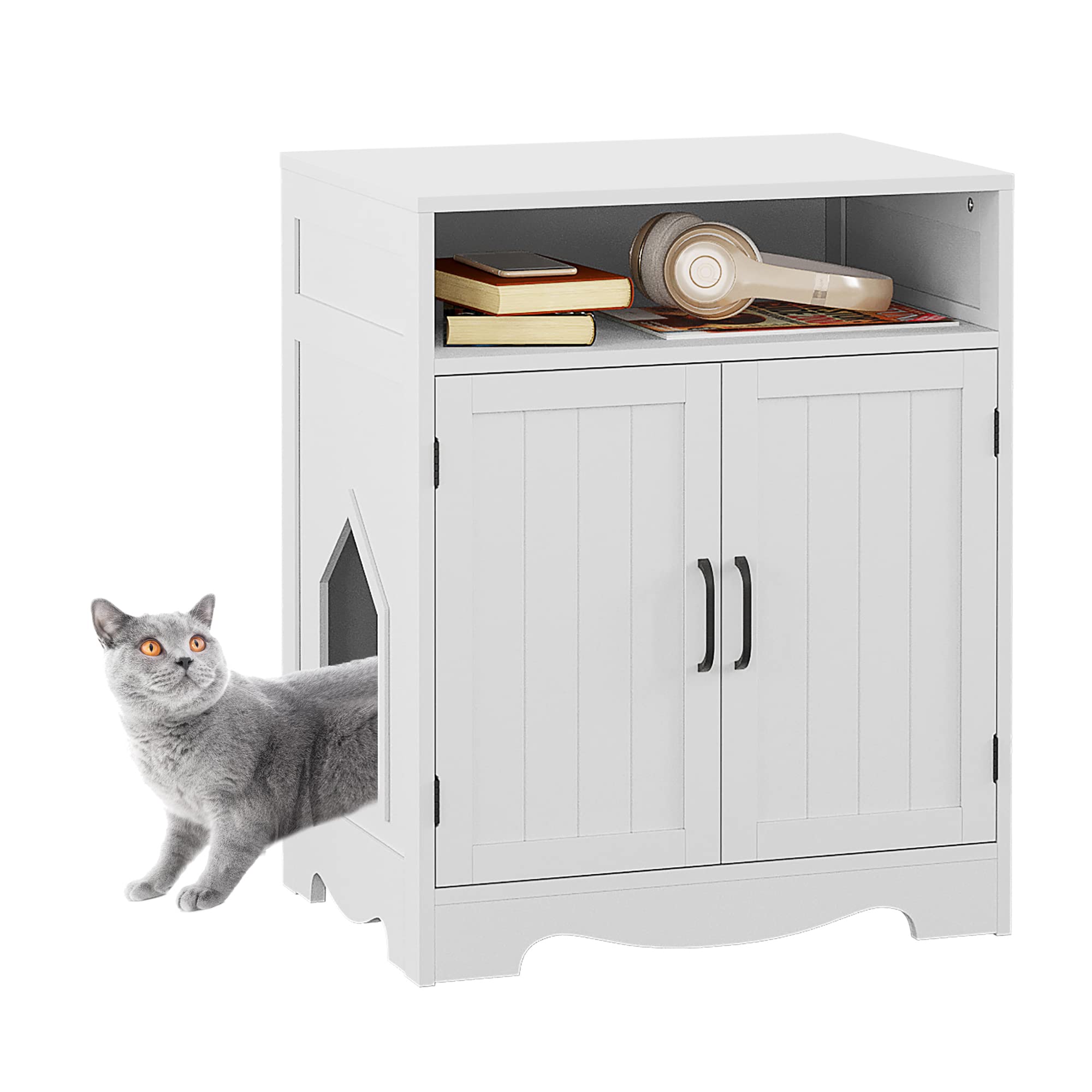Dogs bury their toys due to instinctual behavior and pack mentality, as they consider toys valuable possessions. This behavior is rooted in their ancestry.
Dogs may also bury toys when bored or stressed to provide stimulation and keep their belongings safe. Offering a designated digging area and training them to only bury toys can help manage this behavior. Understanding and accepting this natural behavior is essential in maintaining a harmonious relationship with our canine companions.
It is crucial to provide mental and physical stimulation for dogs to prevent excessive burying of toys and promote their overall well-being. By catering to their natural instincts, we can ensure a happy and healthy life for our furry friends.
The Instinct Of Burying
Dogs bury their toys as a natural instinct to safeguard and protect their valuable possessions like bones and food. It also provides stimulation, so dogs might hide toys and food when bored or stressed. To prevent your belongings from being buried, you can offer a special digging area and train them to only bury toys.
Natural Behavior
Dogs bury toys due to their natural instinct derived from their pack animal heritage.
Evolutionary Reasons
This behavior is rooted in their ancestry, as dogs instinctively safeguard valuable possessions like bones and food.
As protective creatures, dogs bury items to keep them safe, following the footsteps of their ancestors.
Offering a designated digging area and training them to bury only toys can help prevent unwanted burying behaviors.
Sensory Comfort
One of the reasons why do dogs bury toys is related to sensory comfort. Dogs have a natural instinct to seek comfort and security through sensory stimulation. By burying their toys, they create a familiar environment that appeals to their senses, providing a sense of security and comfort.
Securing Possessions
Securing possessions is an innate behavior in dogs. They bury their toys to safeguard them, mimicking their wild instincts to protect their valuable possessions. This behavior is deeply rooted in their pack mentality, as in the wild, burying food and toys helps them ensure a future food source and prevents other animals from taking it.
Hiding From Predators
Another reason why do dogs bury toys is to hide them from potential predators. Burying toys is a natural survival instinct, as it helps dogs hide their prized possessions from potential threats in their environment. This behavior stems from their ancestral roots, where concealing food and toys was vital for their survival.
Social Behavior
Dogs exhibit various social behaviors that are deeply rooted in their instincts and ancestry. Understanding why do dogs bury toys can provide insights into their social nature and the reasons behind this behavior.
Imitating Other Dogs
Dogs are highly observant animals and often imitate the behaviors of other dogs in their pack. When they see other dogs burying their toys or possessions, they may mimic this behavior as a way of fitting in and establishing their place within the pack. This imitative behavior is a crucial aspect of their social interactions and can provide a sense of security and belonging.
Seeking Attention
Burying toys can also be a way for dogs to seek attention from their owners or other members of the household. By burying their toys in conspicuous places, they may be trying to engage in a playful interaction or simply seeking recognition for their actions. This behavior can stem from a desire for social interaction and acknowledgment from their human companions.

Credit: www.petbacker.com
Toy Preservation
Dogs bury their toys as a natural instinct inherited from their pack mentality. This behavior stems from a need to safeguard valuable possessions and can also provide mental stimulation when bored or stressed. To manage this, offer a designated digging area and teach them to bury toys only.
Protecting Valuable Items
Dogs have an innate instinct to protect what they consider valuable. This behavior is deeply rooted in their ancestry, as their wild ancestors used to bury bones and food to keep them safe from predators. Similarly, domestic dogs may bury their toys as a way to safeguard their possessions. This protective nature is a natural and instinctive behavior that dogs exhibit.
Creating A Personal Stash
By burying their toys, dogs create a personal stash similar to how they would stash food or bones. This behavior is linked to their pack mentality, as dogs view their toys as valuable possessions that need to be preserved for future use. Additionally, burying toys provides dogs with mental stimulation, especially when they are feeling bored or stressed. It’s a way for them to engage in a natural and instinctive behavior that brings them comfort and security.
Psychological Factors
Dogs bury their toys due to their natural instinct to safeguard valuable possessions. This behavior is rooted in their ancestry as pack animals and provides stimulation when bored or stressed. Offering a designated digging area and training them to bury toys can help manage this behavior.
Relief Of Anxiety
Dogs may bury their toys as a way to relieve anxiety. This behavior is often observed in dogs that have experienced past traumas or stressful situations. By burying their toys, dogs may feel a sense of security and comfort, helping to alleviate their anxiety.
Compensating For Unmet Needs
Another reason why do dogs bury toys is to compensate for unmet needs. Dogs, as pack animals, have a natural instinct to bury important possessions like bones and food. When their needs for security, comfort, or mental stimulation are not met, they may resort to burying toys as a way to fulfill these needs.
Furthermore, dogs might hide toys and food when bored or stressed. Providing a special digging area and training them to only bury toys can help address this behavior.
Understanding the psychological factors behind why dogs bury their toys can help pet owners create a conducive environment for their furry friends, promoting their overall well-being and happiness.

Credit: wildearth.com
Training And Domestication
Influence Of Human Interaction
Humans play a significant role in shaping a dog’s behavior. Through positive reinforcement and training, dogs learn to bury toys as a way of storing and protecting their possessions.
Learned Behavior
Dogs observe and learn behaviors from their owners. When they see humans burying or hiding objects, they may mimic this behavior with their toys, considering it a normal part of their routine.
Solving Behavioral Issues
Dogs burying their toys can sometimes lead to behavioral issues that may need addressing. Understanding the reasons behind this behavior and finding ways to encourage healthy habits can help pet owners manage and prevent potential problems.
Addressing Excessive Burying
Excessive burying of toys by dogs may indicate underlying issues such as anxiety, boredom, or possessiveness. It’s important to observe the frequency and intensity of this behavior to determine if it requires intervention.
Encouraging Healthy Habits
Ensuring a dog’s mental and physical stimulation is vital in preventing excessive burying of toys. Providing interactive toys, regular exercise, and engaging activities can redirect their focus and reduce the urge to bury possessions.
Dogs may bury their toys due to their natural instincts inherited from their ancestors. This behavior served as a way to safeguard valuable possessions and provide mental stimulation. However, in a domestic setting, excessive burying may lead to behavioral issues that require attention.
Training and offering a designated digging area can help redirect the burying behavior towards appropriate items and prevent damage to personal belongings. By addressing the underlying reasons for excessive burying, pet owners can ensure their dogs develop healthy habits and reduce potential behavioral issues.
Understanding Your Dog’s Behavior
When observing why do dogs bury toys, it’s essential to note that each dog has unique tendencies and behaviors.
For more insights into why your dog buries toys, consulting a professional can provide valuable guidance.

Credit: www.dogster.com
Frequently Asked Questions
Should I Let My Dog Bury Toys?
Yes, you can let your dog bury toys as it’s a natural instinct for them. Dogs bury their toys to protect them or to satisfy their chewing instincts. However, you can offer a special digging area and train them to only bury toys to keep your belongings safe.
Remember that it’s important to understand and respect your dog’s natural behavior.
What Does It Mean When A Dog Buries Toys?
Dogs bury toys due to their natural instinct as pack animals to protect and hide valuable possessions.
Why Do Dogs Bury Their Bones Or Favourite Chew Toys?
Dogs bury their bones or favorite toys due to instinctual behavior. It stems from their ancestry as protective creatures, safeguarding what they value. Additionally, burying provides stimulation and can be a displacement behavior when bored or stressed.
Why Does My Dog Keep Hiding Her Toys?
Dogs bury toys due to their natural instinct to hide valuable possessions as part of their ancestry.
Why Do Dogs Bury Their Toys?
Dogs bury toys as a natural instinct inherited from their ancestors to safeguard their possessions.
Conclusion
Dogs bury their toys for various reasons, including instinct, boredom, possessiveness, and anxiety. This behavior is natural and rooted in their ancestry as pack animals. As pet owners, we can provide a designated digging area and rotate their toys to prevent them from getting overwhelmed and feeling the need to protect their stash.
It’s essential to understand and accept this behavior, as it is a part of their nature and not naughtiness.




